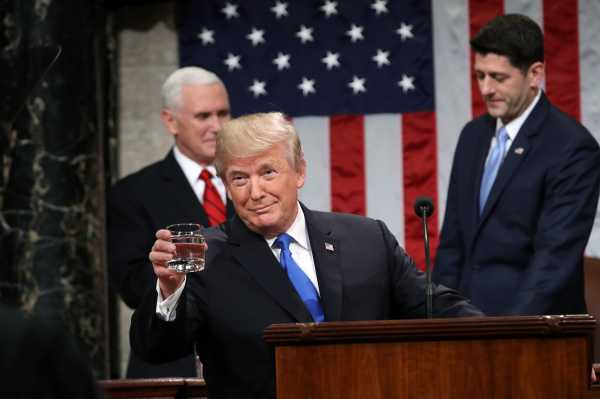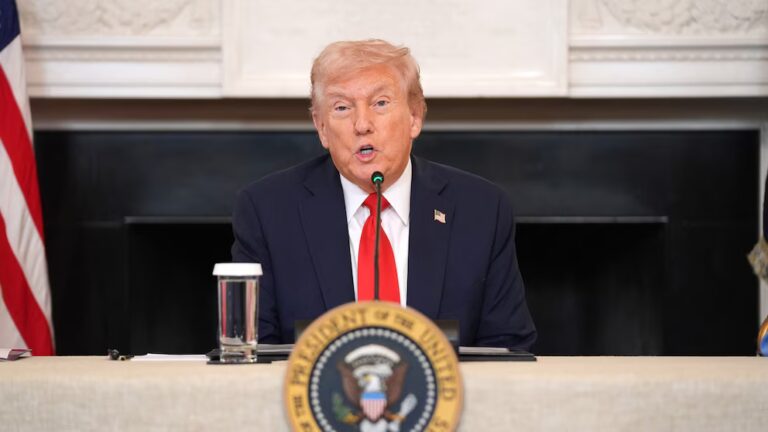
This week, the Senate is debating a solution for DREAMers. Majority Leader Mitch McConnell, making good on his word, brought an empty bill to the floor, permitting both sides to try to round up 60 votes to fill in the text. Inauspiciously, the first day was consumed by a disagreement on where to start. McConnell wanted to begin with a vote on banning sanctuary cities. Chuck Schumer, speaking for the Democrats, demanded the Senate start with President Trump’s proposal. The dispute was particularly confusing because neither starting point has a remote hope of passage. An argument over which idea to reject first is very Senate 2018.
But it’s worth zooming out. The public conversation around the Deferred Action for Childhood Arrivals (DACA) program has gotten confused, with everyone agreeing to pretend, for various self-interested reasons, that President Trump actually wants a DACA solution, and fast. Trump and the Republicans have adopted this posture because DREAMers are wildly popular — giving DREAMers legal status is about twice as popular as Trump himself. Meanwhile, Democrats have agreed to Trump’s framing of his position because they think it helps pressure Trump into a deal.
There is a deep strangeness to this rhetoric. Trump created a crisis for DREAMers — all this began when he unilaterally decided to end the DACA program — and then refused the obvious compromises that could have fixed it. Now he is threatening a veto of the likeliest bipartisan compromises in the Senate. He has taken 690,000 hostages and is now trumpeting the wonderful opportunity everyone has to pay his policy ransom in order to free them, and he is doing all of it while insisting he desperately wants to free them too.
The truth is, Trump doesn’t want a DACA solution. He is willing to accept a DACA solution in return for other things he wants — notably, heavy investments in border security and a large cut in legal immigration — but within the negotiations, a DACA fix is the thing Trump is treating as a concession on his part, not the thing he is trying to make happen. If it were the thing he was trying to make happen, it would have happened already.
Right now, the fate of the DREAMers doesn’t depend mainly on Democrats. It depends on Republicans. If McConnell and Paul Ryan want a deal, they could have one in moments. If Trump wants to save DREAMers, he could do so, and get money for his wall and other border enforcement and immigration changes, tomorrow. But what he actually wants is a suite of restrictionist changes to immigration that are noxious not just to Democrats, but to DREAMers themselves, and he is trying to hide that unpopular agenda behind pro-DREAMer rhetoric, even as he’s holding DREAMers hostage to pass it.
This shell game works until it doesn’t. If there’s no deal, and the Trump administration begins deporting DREAMers over Democratic objections, his real position will become very clear, very quickly.
If the Senate passes a DREAMer deal, will the House vote on it?
Which bring us back to Congress. My conversations with both Democratic and Republican staffers, both inside and outside of leadership, have ended in unanimous shrugs. No one knows what, if anything, can actually pass the Senate. And the difficulty of that question pales in comparison to the difficulty of what, if anything, can pass the House. Ryan has said he will not bring a bill to the floor that doesn’t have Trump’s blessing, and so it is entirely possible that the Senate will pass a deal that never sees a House vote.
If that happens, Democrats have little recourse. They’re in the minority in both the House and the Senate, and after passing last week’s spending deal, they no longer have the threat of shutting down the government.
This is something I got wrong in my initial reaction to the shutdown deal. In preserving the option to shut the government down in the future, I argued, there was no real loss for Democrats, as they hadn’t abandoned any of their leverage. What I didn’t appreciate immediately was how much the shutdown had spooked Senate Democrats — after shutting down the government, they realized they had no strategy for winning the shutdown, and they certainly had no strategy for forcing Trump to fold amid the kind of high-stakes cable news showdown he lives for. So while the shutdown deal held open the option of a future shutdown, in fact, that option had closed, because Senate Democrats had lost faith in it. Now it’s gone entirely.
Over the past week, I’ve been asking Senate Democrats what leverage they have on immigration given that they can no longer shut down the government. The answer, universally, is what leverage exists comes from the issue itself. DREAMers are popular, and deporting them is unpopular. But Donald Trump is the president of the United States, Mitch McConnell is the majority leader of the US Senate, and Paul Ryan is the speaker of the House. They control the process, and they control the outcome.
Sourse: vox.com






